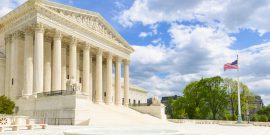Public institutions infused with an ideology will not just roll over. They must be rebuilt.
Pierce at 100
This weekend marks the hundredth anniversary of Pierce v. Society of Sisters, a decision that should be celebrated by everyone committed to liberty and limited government. In this ruling, the Supreme Court declared there to be an unenumerated but judicially enforceable constitutional right for parents to “direct the upbringing and education” of their children. This right is as relevant—if not more relevant—in 2025 as it was in 1925.
Pierce is usually treated as a substantive due process case, and we are aware that many readers of Law & Liberty oppose this approach to constitutional interpretation. Since the mid-twentieth century, progressive justices have treated it as a magic wand that can conjure new rights into existence. We completely reject this approach. However, when justices rely on history and tradition to identify rights long held by legislators and jurists to be possessed by English and American citizens and then protect these rights against improper state intrusion, they act consistently with America’s constitutional order. We return to this issue later, but first, we should discuss the case that we believe should be celebrated today.
Pierce’s History and Progeny
Pierce arose because voters in Oregon passed an initiative in 1922 that effectively banned private schools. The law required children between the ages of 8 and 16, with a few narrow exceptions, to attend public schools. Most private schools in the state were Roman Catholic, and anti-Catholic animus was undoubtedly a major reason the initiative passed. The measure was drafted by a Scottish Rite Mason, it was sponsored by prominent Masons, and it was heartily endorsed by the resurgent Ku Klux Klan in Oregon.
Unfortunately, our nation has a long history of anti-Catholic animus. As Philip Hamburger explained, this animus nearly resulted in an amendment to the US Constitution in 1875, known as the Blaine Amendment, that would have prevented states from funding “sectarian” schools. Everyone in the era understood “sectarian” to mean Roman Catholic. The House of Representatives passed the amendment by a vote of 180–7, but it fell just short of the two-thirds necessary for approval in the Senate. Shortly thereafter, at least 31 states adopted similar amendments (often called “Baby Blaines”).
Even in the 1920s, when the Supreme Court was not known for protecting the rights of individuals against the state, the justices recognized and protected parental rights as applied to unpopular minorities.
The Society of Sisters contended that the Oregon law was unconstitutional, and a unanimous Supreme Court agreed. Justice James McReynolds held that a “child is not the mere creature of the State; those who nurture him and direct his destiny have the right, coupled with the high duty, to recognize and prepare him for additional obligations” and that the act “unreasonably interferes with the liberty of parents and guardians to direct the upbringing of children under their control.” Such a right isn’t spelled out in the Constitution, but the justices held that it was part of the “liberty” protected by the Fourteenth Amendment’s Due Process Clause.
The outcome of Pierce shouldn’t have come as a surprise in light of Meyer v. Nebraska, a 1923 decision declaring Nebraska’s law prohibiting school teachers from teaching any child not past the eighth grade in a foreign language or teaching him/her a foreign language unconstitutional. The Nebraska law, like similar laws in 22 other states, was passed during the First World War and was primarily concerned with the German language.
Meyer arose after a teacher was fined for teaching Bible stories in German. Justice McReynolds, writing for the seven-Justice majority, argued that the exact content of the “liberty” protected by the Fourteenth Amendment’s Due Process Clause was not specified, but that it certainly includes:
the right of the individual to contract, to engage in any useful knowledge, to marry, establish a home and bring up children, to worship God according to the dictates of his own conscience, and generally to enjoy those privileges long recognized at common law as essential to the orderly pursuit of happiness by free men.
McReynolds conceded that the state may “do much” to “improve” citizens of the state, and that this power certainly includes compelling “attendance at some school or to make reasonable regulations for all schools.” But the state’s power is limited; it may not, for instance, take children from their parents and raise them communally, as Plato proposed and Sparta did. Such measures “have been deliberately approved by men of great genius,” but they are inappropriate in our constitutional order, which puts limitations on the power of the state. He concluded that Nebraska’s statute violated the Due Process Clause of the Fourteenth Amendment and thus was unconstitutional.
Building on Meyer and Pierce, the Court in Farrington v. Tokushige (1927) struck down a Hawaii law prohibiting schools from teaching foreign languages without a permit. The opinion, based on the Fifth Amendment’s Due Process Clause (as Hawaii was a federal territory), was again authored by Justice McReynolds, who observed that the “Japanese parent has the right to direct the education of his own child without unreasonable restrictions; the Constitution protects him as well as those who speak another tongue.”
(By now, readers who are not legal historians may well think that McReynolds was a progressive jurist ahead of his time. In fact, he was one of the “Four Horsemen,” conservative jurists who regularly declared unconstitutional FDR’s New Deal legislation until the famous “switch in time that saved nine” in 1937—a switch that did not affect his voting, but which shifted him from being in the majority to being a dissenter.)
Pierce in Action Today
Nebraska, Oregon, and Hawaii all presumably believed that their restrictive educational policies would help form “better” citizens. Today, the estimated 1,215 school districts with “parental preclusion policies,” whereby school district officials transition children to a different gender without parental knowledge or consent, undoubtedly believe the same. And likewise, the Montgomery County School Board, which adopted a policy of refusing to permit parents to opt their young children out of instruction using LGBTQ storybooks and teaching “sexuality and gender identity during English class,” believes that its curriculum is necessary to promote “equity, respect, and civility.”
But many parents disagree with these school districts, and they have been filing lawsuits challenging them across the nation, asserting the fundamental right that Pierce articulated 100 years ago. While the Supreme Court has yet to take a case regarding the constitutionality of parental preclusion policies, the court recently heard oral arguments in Mahmoud v. Taylor, a case challenging the Montgomery County curriculum. Parents from a variety of religious traditions objected that this instruction violates their religious convictions and asked for an opt-out. They were denied.
Although Mahmoud is being litigated exclusively as a Free Exercise Clause case (and we agree that the parents should win on these grounds), they should also win because parents have a constitutional right to direct their children’s education, a right firmly established in the trinity of education cases discussed above.
Protecting Unenumerated Fundamental Rights
Finding judicially enforceable rights in the Fourteenth Amendment’s Due Process Clause has, since the 1940s, been referred to as substantive due process. In the early twentieth century, progressives were highly critical of this approach because it was used to protect “liberty of contract” by striking down legislation aimed at improving working conditions. Today, conservatives are not fond of it because of its association with cases finding a right to abortion and legal recognition of same sex marriage.
Properly conceived, however, substantive due process offers important protection for fundamental rights that are not clearly enumerated in the Constitution. We believe that Chief Justice William Rehnquist was correct when he observed in Washington v. Glucksberg (1997) that:
Our established method of substantive due process analysis has two primary features: First, we have regularly observed that the Due Process Clause specially protects those fundamental rights and liberties which are, objectively, “deeply rooted in this Nation’s history and tradition.” … Second, we have required in substantive due process cases a “careful description” of the asserted fundamental liberty interest.
The majority in this case found that there was no substantive due process right to physician-assisted suicide. Far from being a right “deeply rooted” in American history, helping someone to commit suicide was and still is illegal in most states.
There is a long history and tradition of civic leaders and jurists in America protecting the fundamental rights of parents to control the education of their children. To be sure, states and territorial governments have attempted to interfere with this right, but it is telling that even in the 1920s, when the Supreme Court was not known for protecting the rights of individuals against the state (except for liberty of contract), the justices recognized and protected this right as applied to unpopular minorities (German and Japanese speakers and Roman Catholics).
The right of parents to control the education and moral formation of their children surely includes the right to send them to private schools, to teach them at home, and to opt them out of offensive instruction in public schools. And it is certainly improper for schools to hide important life-altering decisions their children desire to make from their parents. But few families have the resources to send their children to private schools or to homeschool them, and fewer have the time to vigilantly monitor the day-to-day instruction in public schools. By far and away, the best way to protect the right of parents to oversee the education of their children is to enable them to send their children to schools of their choice. We are heartened by strong movements in many states to make school choice a real option. Whether through charter schools, educational savings accounts, or vouchers, giving parents real choices in education is the best way to protect the right articulated so well in Pierce v. Society of Sisters.



